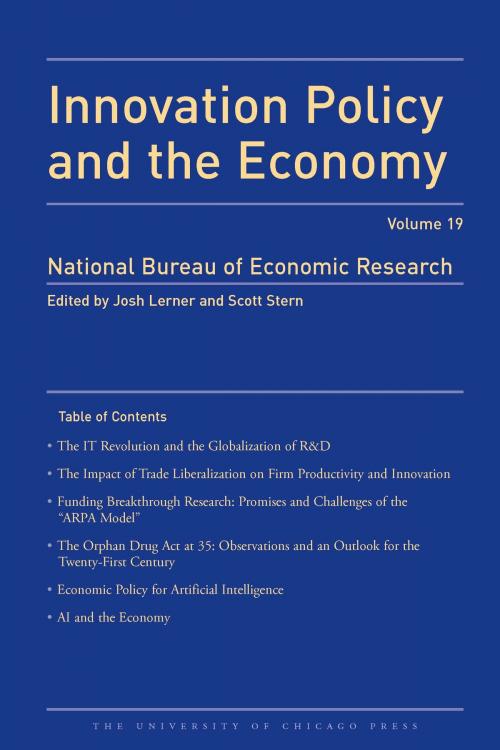Innovation Policy and the Economy, 2018
Volume 19
Business & Finance, Career Planning & Job Hunting, Entrepreneurship, Entrepreneurship & Small Business| Author: | ISBN: | 9780226645414 | |
| Publisher: | University of Chicago Press Journals | Publication: | February 21, 2019 |
| Imprint: | University of Chicago Press Journals | Language: | English |
| Author: | |
| ISBN: | 9780226645414 |
| Publisher: | University of Chicago Press Journals |
| Publication: | February 21, 2019 |
| Imprint: | University of Chicago Press Journals |
| Language: | English |
This volume highlights the interaction between public policy and innovation. The first chapter documents the dramatic globalization of R&D and how this development has affected the efforts of U.S. multinationals to operate on the global technology frontier. The next chapter synthesizes research on the impact of trade shocks on innovation and explains how these shocks’ effects depend on the firms, industries, and countries affected. The third chapter examines the Advanced Research Projects Agency (ARPA) model of research management—an approach to funding and managing high-risk R&D—and offers a method for diagnosing which research efforts are “ARPA-able.” Next is a study of the Orphan Drug Act and the key changes in the U.S. healthcare landscape and in drug discovery and development since its passage in 1983. The next two chapters focus on artificial intelligence (AI). One describes how AI diffuses through the economy and discusses implications for economic inequality, antitrust, and intellectual property. The other investigates issues surrounding firm competition and labor force participation, such as data portability and a Universal Basic Income, and evaluates ways to address these issues.
This volume highlights the interaction between public policy and innovation. The first chapter documents the dramatic globalization of R&D and how this development has affected the efforts of U.S. multinationals to operate on the global technology frontier. The next chapter synthesizes research on the impact of trade shocks on innovation and explains how these shocks’ effects depend on the firms, industries, and countries affected. The third chapter examines the Advanced Research Projects Agency (ARPA) model of research management—an approach to funding and managing high-risk R&D—and offers a method for diagnosing which research efforts are “ARPA-able.” Next is a study of the Orphan Drug Act and the key changes in the U.S. healthcare landscape and in drug discovery and development since its passage in 1983. The next two chapters focus on artificial intelligence (AI). One describes how AI diffuses through the economy and discusses implications for economic inequality, antitrust, and intellectual property. The other investigates issues surrounding firm competition and labor force participation, such as data portability and a Universal Basic Income, and evaluates ways to address these issues.















